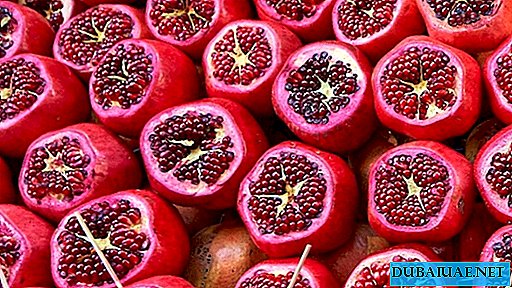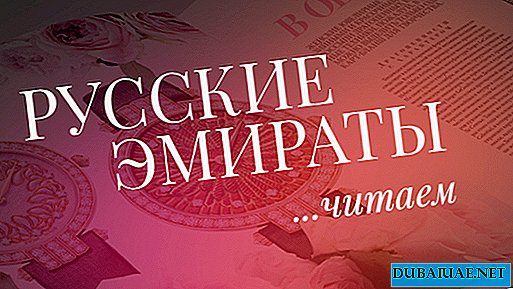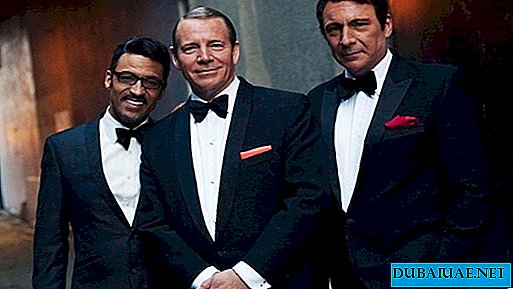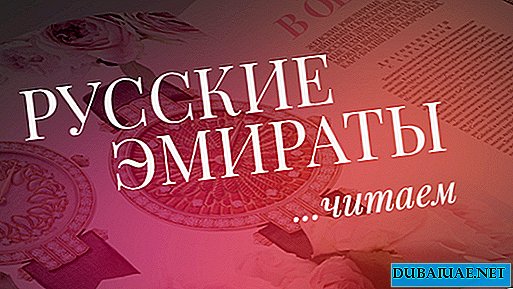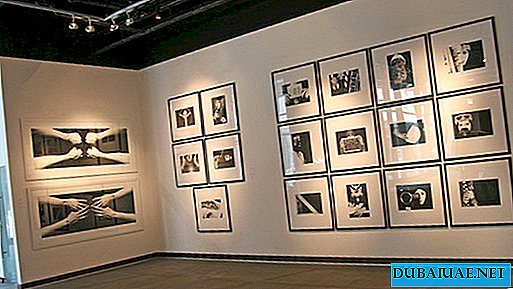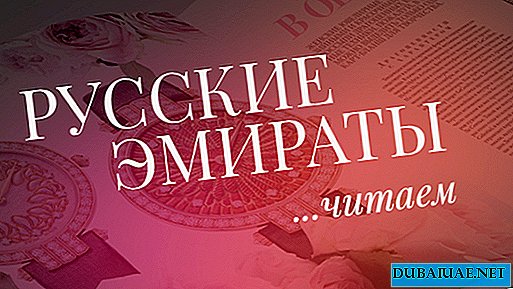 Citizens of the United Arab Emirates celebrated on December 2 this year the 37th anniversary of the founding of their state. To date, the experience of uniting the emirates of the former Treaty of Oman is one of the most successful examples of national unity in the world.
Citizens of the United Arab Emirates celebrated on December 2 this year the 37th anniversary of the founding of their state. To date, the experience of uniting the emirates of the former Treaty of Oman is one of the most successful examples of national unity in the world.
Viktor Lebedev, an oriental journalist, has worked as an ITAR-TASS correspondent for over thirty years in various Arab countries - Syria, Egypt, Sudan, Tunisia, Yemen. Almost half of this term lives and works in the United Arab Emirates. Victor Lebedev is the author of the book “World of the Emirates” from the series “Arabian Arabesques”, the first winner of the International Prize named after journalist-orientalist Viktor Posuvalyuk. The permanent author of many country-specific materials published in our journal, Viktor Lebedev is also a literary translator of the verses of the UAE Vice President and Prime Minister, ruler of Dubai, Sheikh Mohammed bin Rashid Al Maktoum. Poems for the Russian edition were personally selected by the high-ranking poet himself.
Nowadays, the UAE is known on all continents, and in the early 70s, even the majority of the inhabitants of the Arab countries did not even know where this state was located and what emirates it consisted of. Moreover, the representatives of the emirates that are part of the state did not know each other well. Few Abu Dhabi residents have been to Dubai and Sharjah and vice versa. Tobacco from the Dubai Huta for local Midway smoking pipes was a rarity in local markets because it was easier to sell to fishermen from neighboring countries due to the impassability of the emirates and to local tribes.
Not all citizens of the new state knew about the existence of Umm al-Quwain and Ajman. The young Emirates heard about the glorious historical past of Ras al-Kheima, its struggle against the Portuguese and British only in the stories of the old people and never saw the mountain spurs of the Musandam Peninsula, nor the canopies on which the shoals and fins of the sharks were dried by fishermen inaccessible to them El Fujairah , fenced off from the Arabian sands by dull gray-green mountains. Even after the unification of the seven emirates of the former "contractual coast", the inhabitants of the young country for many years were divided by sands, impassability and alienation.
The author of these lines first met the UAE when the country was 16 years old and traveled along its roads through Al Ain, Dubai, Sharjah, Ajman. For a decade and a half of independent development, the majority of the emirates were already connected by asphalt roads. Constantly changing their outlines, the shores of the bay dressed in stone. In place of huts covered with palm branches and canvas, cities rose. The forerunners of future splendor appeared in them - the first high-rise buildings of concrete and glass.
City streets have not yet acquired a characteristic brilliance for today. There were a lot of plain, whipped up 5-6-storey houses, on the facades of which stuck boxes of air conditioners, flooded the sidewalks with condensate. It was surprising that even then the sidewalks in front of the boxes of the first modern buildings, where local banks were located, were cleaned with vacuum cleaners.
Camels still roamed the roads in Abu Dhabi, but the Al Ain - Abu Dhabi highway was already fenced in to prevent the one-humped giants - the main property of the country at that time - from entering the roadway. Al-Maktoum Bridge in Dubai seemed spacious and did not know traffic jams, while Dubai and Sharjah, now closed, were separated by kilometers of lifeless sands. The old people were still alive who remembered how they traveled from Dubai to Sharjah not in a taxi, but on donkeys, hiring them for one Indian rupee.
The road from Abu Dhabi to Dubai was two-lane. There was not a single flyover on it, and the rides were regulated by film circles. Having learned that I was going to Dubai, my British neighbor warned of caution, because he considered the road very bad.
There has not yet been a highway connecting Umm al-Nar with Shahama along the seashore, where the resort area of Ar-Rakh is now upset. The path from Abu Dhabi to Dubai lay through the highway leading from the capital to Suweyhan.
On the border between the two emirates, not far from the town of Gantut, there were customs offices. She no longer worked, but reminded of the recent past, when a resident of Abu Dhabi could enter the emirate of Dubai only by presenting documents and paying a duty for goods if they were with him.
The high tower of the World Trade Center, near which there are now exhibition pavilions, a motorist traveling from Abu Dhabi could see, being ten kilometers from Dubai. She stood alone among the sands at the entrance to the city and was popularly known as the "white elephant in the desert." Most of the employees in the federal departments were foreigners.
The Emirates did not yet have its own competent personnel. They had to be hired in Bahrain and Kuwait, which were ahead of the young state in socio-economic development and more distant countries of the Arab region. In the ministries one could meet Palestinians, Jordanians, Syrians, Egyptians, and even immigrants from Asian countries.
In the early years of the UAE, many schools were built. To fill them with students, parents were seduced by student scholarships. The young generation studied, prepared to take control of and manage the thousands of foreigners hired to improve the country. Those wishing to engage in agriculture, which was not, as such, except for camel husbandry, received free land, fertilizers, and foreign farm laborers paid by the state.
Now everyone knows the brand-name buildings of the Etisalat television and radio corporation, which operates in dozens of countries around the world, serving more than 70 million subscribers. In the late 80s, she huddled in primitive rooms, occupying several apartments in different buildings. But even then, the technology in the company was new. Used telexes with memory, which have not yet been seen in Moscow. A few years later they were replaced by faxes, again earlier than they were widely used in the Russian capital.
Remembering all this on the beautiful highway leading from Abu Dhabi to Dubai, in a car that receives excellent maintenance, using impeccable mobile communications, one cannot help but admire the man who created this state, and, being not very literate, had the courage to take a huge burden to create from scratch a country and a nation. This person was Sheikh Zayed bin Sultan Al Nahyan.
After the discovery of huge reserves of oil in Abu Dhabi in the late 1950s, which was exported in 1964, the ruling circles of the emirate of Abu Dhabi were afraid not only to declare openly, but even to think about this land tormented by the sun and waterlessness fabulous wealth fell. They say that the dollar treasury of the predecessor Sheikh Zayed, perplexed, sitting on money, remembering that rare of his relatives who ruled in the emirate were dying because of property divisions, they ate mice.
Sheikh Zayed, who would have turned 90 this year, having received power from the hands of the elders of the tribes, was not only not afraid to announce the riches that benefited the country, but also acknowledged that they “cost nothing if they do not serve people, and the state is among all its affairs should give preference to caring for a person and raising a citizen. " “Man is the most precious value,” said the first emirate president.
Revenues from the sale of oil were not hidden in a capsule. They are aimed at meeting the needs of the people. In order to teach and cure illiterate compatriots who suffered from tuberculosis, anemia and eye diseases, for generations who knew one remedy - a laxative, the state paid great attention to education and medicine. The ministries of education and health have become the largest government departments. Sheikh Zayed acted as the unifier of the Arab Emirates located on the western shore of the Persian Gulf, to whom generous financial assistance was provided. On December 2, 1971, the United Arab Emirates State was proclaimed, which, along with Abu Dhabi, included the emirates of Dubai, Sharjah, Ummel Kuwain, Ajman and Al Fujairah. In 1972, they were joined by the emirate of Ras al-Kheim.
 Under the leadership of Sheikh Zayed, the UAE has come a long way - from the tribal system with elements of slavery to a state with a thriving market economy. Residents of the capital and other cities moved from clay buildings and Bedouin tents to multi-storey towers and comfortable villas. The standard of living of the country's population, producing more than 2.5 million barrels of oil per day, skillfully using modern technology and knowledge, conducting almost duty-free trade with dozens of states, is one of the highest in the world. According to the newspaper Al-Khalij al-Iktisadi as of October of this year, the average annual per capita income in the Emirates is 118 thousand dirhams (32, 2 thousand dollars).
Under the leadership of Sheikh Zayed, the UAE has come a long way - from the tribal system with elements of slavery to a state with a thriving market economy. Residents of the capital and other cities moved from clay buildings and Bedouin tents to multi-storey towers and comfortable villas. The standard of living of the country's population, producing more than 2.5 million barrels of oil per day, skillfully using modern technology and knowledge, conducting almost duty-free trade with dozens of states, is one of the highest in the world. According to the newspaper Al-Khalij al-Iktisadi as of October of this year, the average annual per capita income in the Emirates is 118 thousand dirhams (32, 2 thousand dollars).
Emirates loved their leader, six times re-elected president, as popularly and genuinely as they love in the family of her dearest member. Died four years ago, he remains a precious symbol of the nation he created.
After the death of the founder of the state, Sheikh Khalifa bin Zayed took up the main state post. By electing the eldest of the 19 sons of Sheikh Zayed as president, the High Federation Council consisting of the rulers of Dubai, Sharjah, Umm al-Kuwain, Ajman, Al Fujairah and Ras al-Kheima confirmed the continuity of the course that Sheikh Zayed led the country. This course in the domestic sphere consists in the dedication of the federation with all possible efforts aimed at strengthening and economic development of all emirates, rejecting localism, educating a citizen, patriot of his country, not confined to his tribe or native emirate.
The Emirate state remains an active supporter of a just settlement of the Middle East problem, a champion of strengthening Arab unity and solidarity, pursues a balanced, sober policy in the Islamic community of the world, rejecting any manifestations of Islamic extremism.
The 60-year-old UAE president, Sheikh Khalifa, is known as an active policy maker in Sheikh Zayed. He participated in its formation over the past years with his stepbrothers, among whom the sons of the president from Sheikh Fatma bint Mubarak, who remains the most respected wife of the late president, who succeeded 9 wives for a long life, play a leading role. The most influential of the sons of Sheikh Fatma remain the Crown Prince of the Emirate of Abu Dhabi, professional pilot Sheikh Mohammed bin Zayed, Deputy Prime Minister Sheikh Hamdan bin Zayed, Foreign Minister Sheikh Abdullah bin Zayed, as well as the Minister for the Presidency Sheikh Mansour and the Minister of the Interior Sheikh Safe.
The current UAE president, Sheikh Khalifa, was born in 1948 in the city of Al Ain in the oasis of Al-Buraimi. Here, under the crowns of date palms, the slave-owning market was still working, and so far there were no regular schools on the endless sandy expanses. The high-born first-born student read in the Qur'an and received traditional family upbringing and education. By tradition, as the eldest son, he played a second role in the family after the father, some of his brothers are suitable for fathers by age and retains the leading role in the Al Nahyan family.
Sheikh Khalifa is known for his modesty and courtesy. According to the press, he is "an exemplary member of the family", "is distinguished by high responsibility, foresight, breadth of vision and generosity." He loves history and poetry. His environment is composed of poets, writers and intellectuals. He always spends his holidays abroad, paying special attention in recent years to Turkmenistan and Kazakhstan, where he likes to hunt with falcons.
The sons of Sheikh Zayed care about the socio-economic development of the country. An equally important role in its further rise is played by the ruler of Dubai, Sheikh Mohammed bin Rashid Al Maktoum, who holds the posts of vice president and prime minister of the UAE.
Among local entrepreneurs, there are almost 60 thousand indigenous dollar millionaires, and there are dollar billionaires who do not belong to the tribal sheikhs. The names of the richest emirates are known. These are Abdullah al-Futtaym, Majid al-Futtaym, Mahdi at-Tadjer and Khalaf Habtur.
At the enterprises of the Al Futtame family, which is considered the richest in the country, employs more than 10 thousand people of four dozen nationalities. She is engaged in freight transportation, construction, car trading Toyota, Honda, Lexus, Volvo, BMW, Kreisler, owns several large shopping malls and hotels not only in the UAE, but also in several Arab and African countries. She also owns, as a partner, the new Ski Dubai ski resort, adjacent to the Mall of the Emirates.
The name of the richest local businessman Halaf Habtur, whose capital exceeds $ 2 billion, is associated with the construction of Burj Al Arab and Jumeirah Beach hotels, as well as the expansion of the Dubai airport. He sells cars and real estate, develops publishing.
Social assistance to the population is well developed through a system of various funds.
In the current global financial crisis, a number of preventive measures have been taken to protect national interests. The government undertook to protect national banks from any insurance threats and to guarantee deposits and bank deposits. It stated that it would guarantee interbank credit operations and, if necessary, provide the banking system with the necessary liquidity.
"We take the protection of our financial system and our banking sector seriously in the name of ensuring the highest interests of our country and our people," said Sheikh Mohammed bin Rashid Al Maktoum, head of the Emirate’s cabinet, ruler of Dubai, in October.
The total amount of state financial "injections" in the UAE banking sector in September and October exceeded, according to the local press, 120 billion dirhams (almost 32.7 billion dollars).
Thanks to the government’s concern for indigenous people, the United Arab Emirates is better than most countries to keep their citizens at home. The percentage of emirates emigrating abroad is negligible. Emirates do not seek treasures across the seas. They are well on their warm shores.


